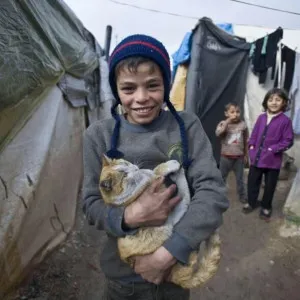A picture.
A boy hugging his cat, a broken smile on his face.
The longer I look, the more it seems as though he’s about to break down and cry.
He is one of many — 100,000 strong — who escaped from Aleppo.
He is miles away from home, surrounded by barbed wires, torn apart from his family, calling a pair of sheets home.
The more I look, the more I imagine. I imagine the boy and the cat cuddling one another at night for warmth, trying to fall asleep nearly starved, being awoken with each and every sound. Was that a bomb? Gunshots? Soldiers? I imagine a boy desperately searching for hope but only finding his cat to hug.
As this innocent pair lay on cold dirt, a swarm of well-dressed gentlemen, one side covered in blue flags, the other in red, are bargaining in Brussels.
“We want to send all the refugees who fled to Europe back to Turkey.” I hope your government can work with us.
“Turkey is ready to work with the EU.” It just requires a little ‘motivation.’
How much motivation, to be exact?
Does $3.2 billion work?
You’ve got yourself a deal.
Is this the cost of a human being? Is this the price tag we’ve placed on the lives of millions? I can understand that countries want to protect themselves from potential terror attacks and that an influx of immigrants raises threat levels. Just this past year, my very own family and friends came face to face with suicide bombings in Istanbul and Ankara. I get it, and I can see that a government’s primary job is to protect its own citizens. But this is not the way to go.
As more and more information is revealed about the attacks that shook Europe, it grows increasingly clear that the attacking terrorists were not refugees. They were radicalized citizens. Entirely closing our borders to those in need, hating those that are different from us, will only increase this radicalization.
As I write these very words, a Syrian man named Mohammed Faris is living in a two-bedroom house with six other people in a poor district of Istanbul. He felt unsafe and walked across the border in 2012, when armed conflicts intensified. He’s hopping from one job to another, trying to make a living, while also speaking at conferences. Anywhere he speaks, he stresses the same thing: “Syrians are not beggars and thieves. Everyone is a part of this migration: both the professors and the uneducated. We are workers, not beggars.”
This man, who is forced to live in a strange land in desperation, was a hero in Syria. He had “airports and streets named after him, money, a house, security guards.” He was the first and only Syrian astronaut who went to space and ended up spending 7 days, 23 hours and 8 minutes in orbit. He learned to look at the world like “a mother looking at her baby, no discrimination, no borders, no conflict.” He misses his home every day but cannot go back. Ever since he rose in protest against the Assad regime, he’s been declared an enemy by the state and all of the terrorist groups plaguing Syria.
These people are not terrorists. They are honorable individuals who were driven out of their homes, torn from their lives, separated from their friends and families. They don’t want to come to our countries to experience a life of leisure; they want to escape imminent and terrible danger.
Look back at the picture of that brave boy holding his cat. The entire world turned its back on him. We watched him starve, freeze, get blown apart, bought, sold, raped, lapidated, hung, shot, executed, forced to live under the most heinous conditions. And we did nothing. We abandoned him.
But he did not abandon his cat.
He lost his past, his present, his future, his everything. But he still gave his cat more love than what the entire planet could spare for him.
Every time I look at this picture, my eyes tear up. I try to comfort myself by saying the same thing over and over. At least they are still alive.
That picture was taken in early February. Then they were still alive. Now? I don’t know. I can only hope.
Contact Ali Sarilgan at sarali19 ‘at’ stanford.edu
